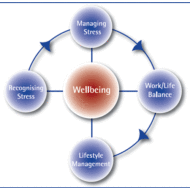Posted by Managementguru in Business Management, Change management, Human Resource, Organisational behaviour, Principles of Management
on Mar 31st, 2014 | 0 comments

India often looks at Japanese or American models to comprehend the concepts of management. In reality, Indian scriptures can be considered as treasuries of management. The Bhagavat Gita, the Vedas and the Epics highlight the true spirit of working together and the need for de-stressing the self for enhanced performance levels. The idea of NISHKAMYAM (to perform one’s own work without expecting a result) is truly said to be the highest ideology preached by Lord Krishna. What Induces Stress? A dynamic condition in which an individual is presented with an opportunity or confronted with a demand, related to what she or he desires and for which the outcome is uncertain but important, can be called a stressful situation. The consequences of stress in an organizational set up express themselves in the form of physiological, psychological or behavioral symptoms, which are harmful to the individuals who experience high levels of stress. Symptoms of stress: AnxietyDepressionIncreased job dissatisfactionAbsenteeismDecline in productivityRapid turn overHigh blood pressureHeart diseasesHead aches Stress Can be Motivating: While long term stress is harmful to the individual and organization as well, it is said that short term stress serves the purpose of task accomplishment by individuals or groups, within the stipulated time. It serves as a motivation factor rather than a causative agent of frustration. It has been proved by scientists and medical researchers that stress has a direct effect on the metabolism of a person, that causes increase in heart and breathing rates, increase in blood pressure, thus inducing heart attacks. Equally important are the behavioral and attitudinal changes that are created by stress, which cannot be overlooked. Job Satisfaction: Psychological symptoms arise due to job-related dissatisfaction, boredom, work pressure, irritability and procrastination. Sometimes forceful involvement may also lead to decreased job satisfaction. The job to be carried out can be finished at the particular time if the individual is able to give one’s best shot. But when it is performed under stress, they complete the job with dissatisfaction. When the incumbent is asked to perform a task that lacks clarity, naturally ambiguity arises in his mind followed by anxiety. Behavioral Symptoms of Stress Changes in productivity levels, absence, and rapid staff turnover are stress symptoms of behavioral nature. It might be expressed even in the form of increased smoking, consumption of alcohol etc., Say for instance, in production department, when there is a need to supply a product in a very limited time, the workers may be active initially, but the performance slows down when they get totally tired or dissatisfied with the work. Again the demand by the superior adds additional stress that reaches unmanageable levels. Similarly, people taking care of administration, banking, marketing and other office related works fall a prey to stress. How to manage stress? From an organization view point, it is believed that a limited amount of stress may work wonders in terms of performance, with stress acting as a “positive stimulus”. But even low levels of stress are likely to be perceived as undesirable from an individual’s stand point. How could be the notion of management and individuals be different on the acceptable levels of stress? It does not solve the purpose. Individuals have to understand that, they have to live up to the expectations of the management in order to enhance their credit ratings, in terms of promotion and pay. They have to understand that challenges are to be perceived as opportunities to prove their mettle. Self and situational analysis, work analysis, time management and physical well- being are some techniques that practically solve problems of stress. “De-stressing the Self” Techniques for Employees Organisations can reduce stress of the employees...


